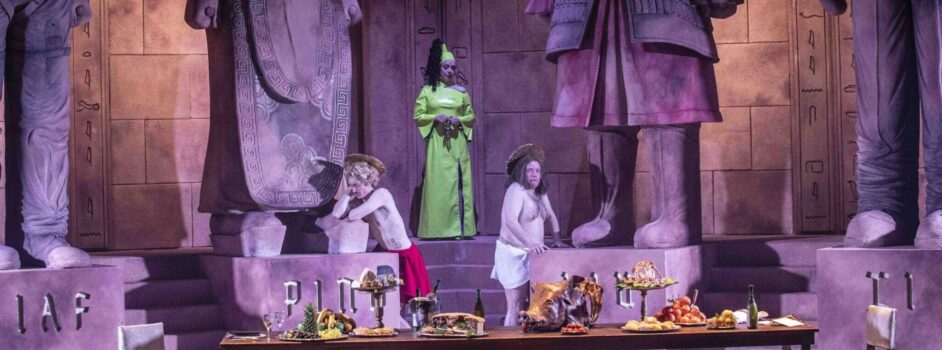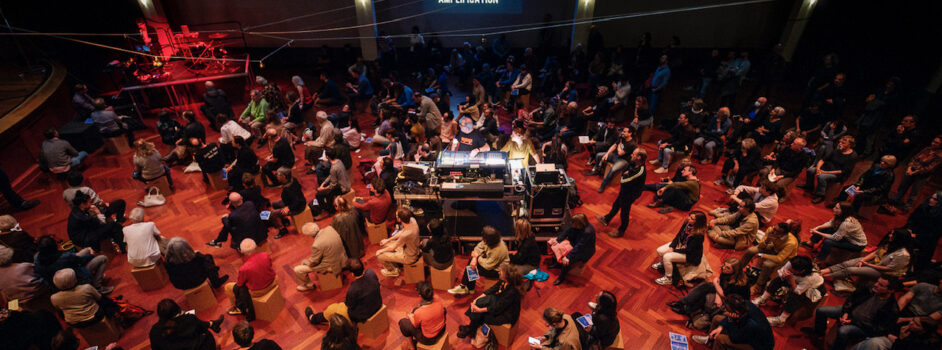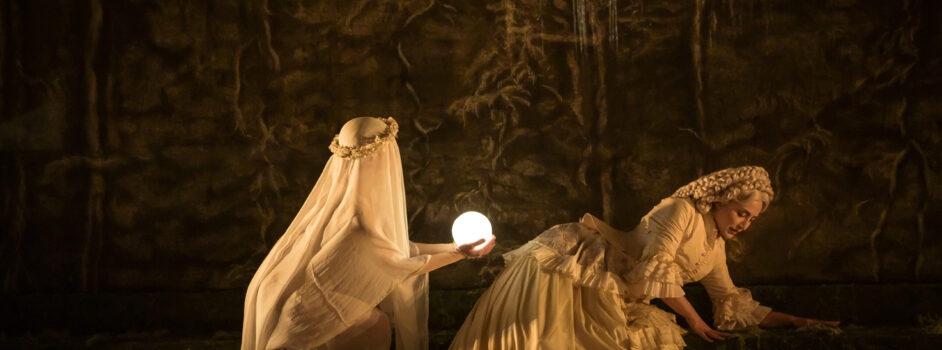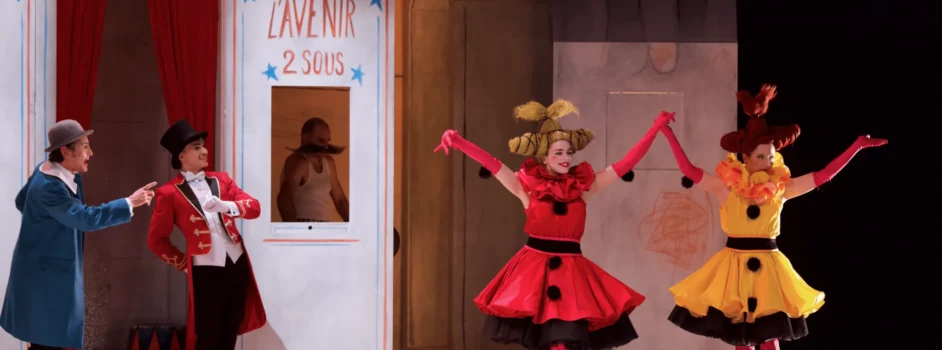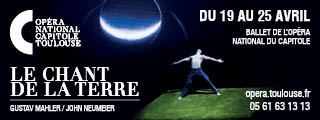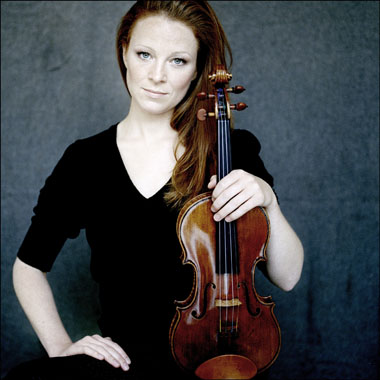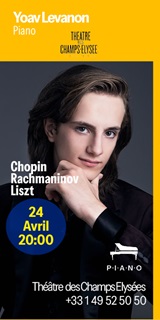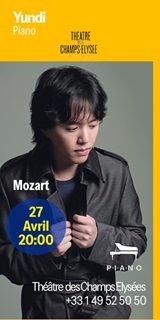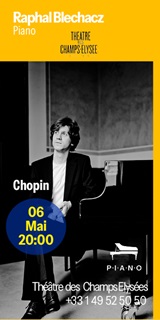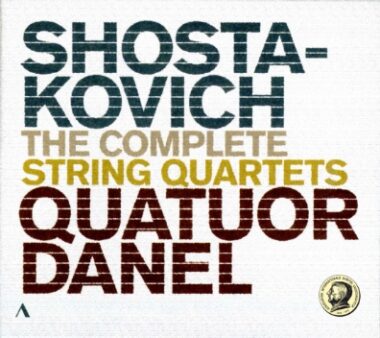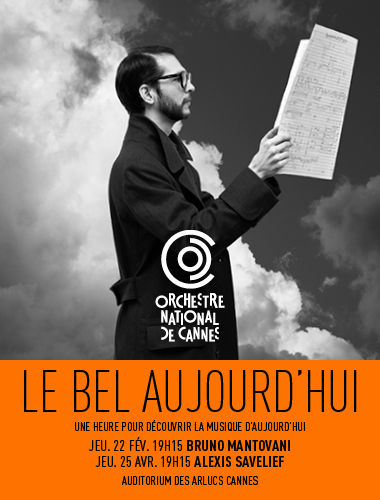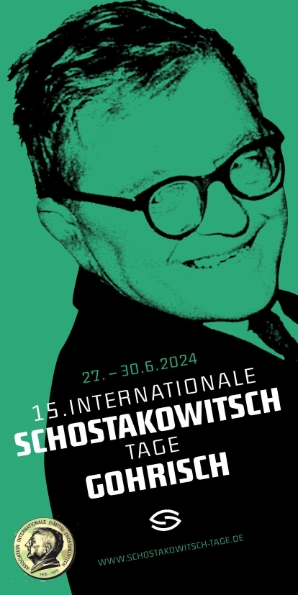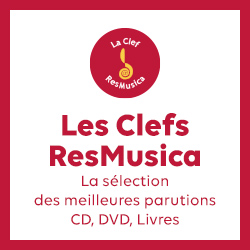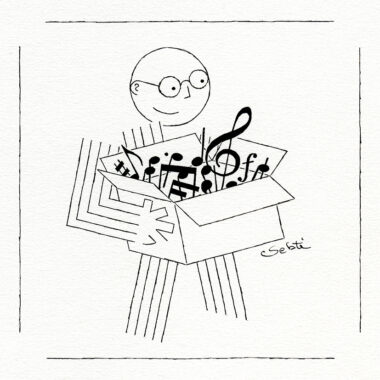Plus de détails
The ICMA jury gave the Artist of the Year Award 2013 to Carolin Widmann, along with the following statement :
« The German violinist has turned into one of the outstanding – and most uncompromising — musical personalities of our age. Her sensitivity and intelligence as an interpreter enable her to express the deepest emotions in the romantic sonatas by Schumann or Schubert, while at the same time feeding her curiosity for contemporary music and the exploration of experimental sonorities. »
“This is torture. It looks glamorous from the outside, but why do you want to do this?”
ICMA: A violinist is to find his own personal sound, on the violin this is for artistic identity. Could you describe your idea of sound?
Carolin Widmann: I think there is not one sound, there is a million sounds according to what you feel in the music. It depends on the repertoire, it depends even on the phrase that you are in and the place you are in, and to search for it is a life-long task; and I really feel our task is to find the right sound for the right piece, and it might change as well. Now I might feel differently about certain places in the Chaconne or in the Brahms Concerto than a few years ago. So it changes just as we change and it does not ever stay the same. I feel music is the most ephemeral of arts, it vanishes as soon as the sound has been played, it's gone and is now only in our memories.
ICMA: Sound does not come from nothing, sound is the result of development. Can you describe your sound development from the beginning, how to develop an idea of that?
CW: What is so interesting on the violin especially but maybe on every instrument, is that the difference between a very strong powerful sound and a chock sound is very close. I mean if I play very strongly it sings and it's still open, if I press a bit more it's dead. And to find where it breaks is really interesting, because I feel so many musicians just stay in the middle, in the average. I really don't like that, because this is just a tiny spectrum and I want to go to the left, to the right, to the depth of this middle field, and there it becomes interesting. Also in the pianissimo, where is the difference between silence and a very faint little pure sound, that's where it's getting interesting. It's like for painters: how close can you come to white without being white, and what is the blackest black that still has a depth to it? So I really feel we are creators. We are reproducing what a composer wrote, but here we are becoming creators with the sound.
ICMA: So the sound is not an abstract idea, it will be established in relation between the instrument and you. So tell us some words on the instrument you play.
CW: I would go as far as to say a sound is alive. It's an alive creature that I have to treat with the utmost love, otherwise I kill it, I have to let is speak. I always say you don't create it, you let it happen, it's already there. The universe has been there so much longer than us, and the sound has already been there, so find it. The instrument is our medium to find it, and to let it live. And for me it's of course fascinating to have a violin from 1774 that has lived so much longer than me, has experience so much more than me, and can tell me so much. My job is to ask it the right question, so it gives me as much as possible of itself.
ICMA: So what was first: the violin or the idea of sound?
CW: Of course the idea of sound. That's a metaphysical idea, absolutely, and if you read even Greek dramas, it's constantly around. If you think of the sirens or Pan, so many stories of fairy tales with sound, sound was before human beings.
ICMA: If you have a look back at your career, are there initial points when you definitely knew, yes, I will be a violinist.
CW: Yes, and I have to say I am so grateful that in our society, in Germany in the 1980's and 90's, I was exposed to these things as a normal child. My parents were not musicians, my parents are not millionaires, but as a normal child I could see the Carnival of the animals for example by Saint-Saëns, and I was so impressed with the violins, the owls and the owls costumes, and we could go to the Munich Opera and see the Magic Flute, we could see I will never forget Freischütz with Carlos Kleiber because it was such a strong memory. I knew I wanted to be a musician, and then the violin came later. I really feel it was first music, music, music and operas, and instrumental concerts, Matthäus-Passion, things like this. From my earliest memory we went every year to two performances of the Matthäus-Passion as long as I can think. This made me want to do something and the violin happened to come along.
ICMA: Some musicians told me, there are some moments, on stage or wherever, when the instrument begin to play them. Do you remember such situations?
CW: I wouldn't limit it to the instrument, I would say when the music plays us and become something bigger than us. That's is an ideal case when everything is right, often in chamber music I feel, when everything is right also from the personal perspective, when we get along, when also the rehearsals were great, and we have thought about everything, then we go on stage and something happens, that's magic. You cannot describe it, and this is why I feel so blessed about my profession.
ICMA: Mainly for string players it is a body to body thing, to handle the violin or the cello. How to find the right way to treat the instrument?
CW: It's a strange posture for us, it's a distorted hug, you want to hug like this but this is like that, but nevertheless this is a hug. I also feel it is prolonging our body, it is a direct prolonging of our lungs, and our heart and our spirit, directly into the instrument, and out of the instrument into the huge auditorium. And I always feel when you want to say something, you should go directly. On the piano you have so many in between steps, you hit a key and a meter away it hits the hammer, and the hammer hits the cord and so forth, it's very mechanical, whilst we have our instrument directly close to our bodies. The danger is always, because you feel music so much, to want too much, and that is really difficult. When you feel the music so much, you can kill it basically, that's the biggest danger. So you have to say everything you want to say but in a relaxed way, which is very difficult if you feel music very emotionally.
ICMA: Twenty/thirty years ago we had already big discussions about schools, violin's schools, piano's schools. Do you feel any special affinity with some of the schools?
CW: I am a completely funny animal, I am such a strange mix. I feel these things are resolving now, we are not speaking about schools any more, that was very much in the eighties, with Ivan Galamian, Dorothy DeLay and the American school against the Russian school, also a ruminant of the cold war of course with the violin school. My teachers come very much from the European tradition, but for me the most influential violin teacher was Michèle Auclair and she herself was coming from the French-Russian school and made such a fantastic mix for herself of these schools. It really influenced me, combined with my German upbringing. So I am probably a very original product of multiculturalism.
ICMA: My favourite of your recordings is the Schumann's Violin Sonata. When one hear you play chamber music, it's always special because of this interplay one can see with you your partners. Do you think chamber music is the main thing for yourself?
CW: No, I really enjoy equally a big symphony orchestra with a concerto if everything is perfect. If you have a conversation for example with one person, it's much more flexible, as you can imagine. The more people there are, the less flexible it is, the more you have to say things before. And what I love about chamber music when you have the right partners is that you practice everything, and you work, you work, you work, and then you go. With the orchestra, even the rehearsal time isn't there. If I have a Mendelssohn concerto with orchestra I have one rehearsal, dress rehearsal, concert, how can I do anything? There is almost no time to create together with the conductor. That's why chamber music has more chance, there is not this rigid schedule, we can rehearse until midnight if we feel like it. With an orchestra that's more difficult, but I love every formation. I love being on stage alone, playing Bartók's solo Sonata and Bach, I love it. But I love equally to have sextet or octet, or chamber orchestra or leading an orchestra or a big symphony orchestra, it's also a fantastic feeling if everything is great; and if you get along with the conductor and the orchestra, that's make all the difference.
ICMA: You are famous for performing, and recording of course, the contemporary music. So do you find recording and performing contemporary music much more modern as performing traditional classical music?
CW: No it's the same, same approach for me, absolutely. And I am equally unhappy if I miss a note, even if nobody hears it, but it is equally torturing to not be as good as you have practised it.
ICMA: You are also a teacher, a professor in Leipzig and it's very difficult for young musicians to find the right way to the big musical scenes. What are the 3 main points you would tell young musicians, how to come through the future?
CW: I don't know if I can reduce it to three, but I feel very important to really work. Students come and say “Oh, I could not practice, I had orchestra rehearsal”, so what? Then you practice at 2 in the morning, I have done it myself, you just have to work. Not because I tell you to work but because you want to make this music sounds good, it's your job, because we have such fantastic music from Mozart, to Brahms to Boulez. Number 1.
Number 2, really be yourself, don't listen to anybody who tries to tell “this doesn't work” “and this doesn't work”, you have to find out yourself. And if it doesn't work, find another way, but listen, and learn, and be curious.
So maybe these three things: work hard, be yourself, and be curious. Really be curious about the life, about the world, about everything that you don't know, everything: about science, about technology, about history, about literature, about poetry. About music of course as well, but it's just one thing of an ocean of what we don't know.
ICMA: Nowadays and we all know that, music is not only music, music is about money and marketing, how do you handle these extra-musical things?
CW: Wow… I don't think I do! If we have an interview, is that considered marketing? I am interested in what you are asking me. Everything which is just about money and marketing, I am not interested. It seems that people don't approach me this way either, to make air concerts for BMW or something. I don't feel I am very much part of that.
ICMA: We have a lot of famous musicians who are not able to talk about music, do you find it important to discuss music?
CW: I don't think discussing with somebody, but with myself. It is extremely important to know why I am doing what. This is what makes life interesting. Why do I decide to do this? Of course, leave space for the instinct, but the skeleton is to know precisely why you are doing this. Why do you travel here, and don't sleep, and this is torture. It looks glamorous from the outside, but why do you want to do this? You need to wake up every morning and know it. I really feel I need to have it clear in my mind. This is what I want to do and this is why I am here to do. Maybe for other people, but mainly for myself, because I need to do it. And if I talk about it, this is fine too.
Photo : Promotion / Allmusic
Plus de détails
The ICMA jury gave the Artist of the Year Award 2013 to Carolin Widmann, along with the following statement :
« The German violinist has turned into one of the outstanding – and most uncompromising — musical personalities of our age. Her sensitivity and intelligence as an interpreter enable her to express the deepest emotions in the romantic sonatas by Schumann or Schubert, while at the same time feeding her curiosity for contemporary music and the exploration of experimental sonorities. »

